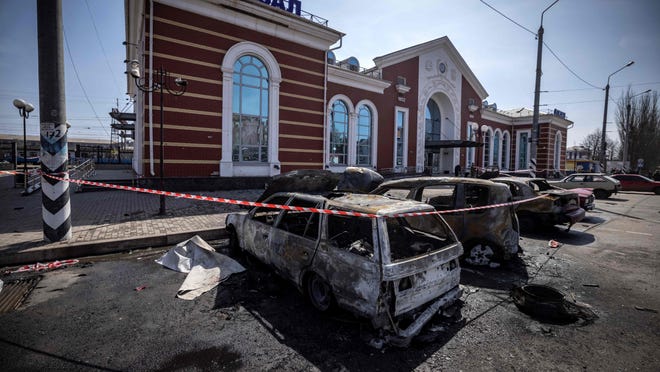Thousands dead in Mariupol, separatists claim gains
Global concerns that Russia will resort to chemical weapons in Ukraine were rising Tuesday after a separatist spokesman suggested to a Russian TV audience that separatists may use chemicals against Ukrainian soldiers holed up at a giant steel factory in Mariupol “to smoke them out of there.”
Eduard Basurin, who said 80% of the Mariupol port had been “liberated” by Russian-backed separatists, was later quoted by the Interfax news agency as saying separatist forces “haven’t used any chemical weapons in Mariupol.” The comment came after a Ukrainian unit defending Mariupol claimed without providing evidence that a drone had dropped a poisonous substance on its positions.
Pentagon press secretary John Kirby called the reports of chemical weapons use “deeply concerning.” U.K. Foreign Secretary Liz Truss said officials were working to “urgently” investigate what she called “a callous escalation” of the war.
“One of the spokespeople of the invaders said they are considering using chemical weapons against the defenders of Mariupol,” Ukraine President Volodymyr Zelenskyy said. “We take it very seriously. I want to remind world leaders that a possible use of chemical weapons had been already discussed by the Russian military.”
Chemical weapons or not, the world should be prepared for a barbaric assault by Russian troops in eastern Ukraine, Kirby said.
“I think sadly we can all expect that those same brutal tactics, that same disregard for civilian life and civilian infrastructure will probably continue as they now focus in a more geographically-confined area in the Donbas,” Kirby said.
USA TODAY ON TELEGRAM:Join our new Russia-Ukraine war channel
VISUAL EXPLAINER:Mapping and tracking Russia’s invasion of Ukraine
Latest developments
►Asian stock markets fell again Tuesday as investors waited for U.S. inflation data amid unease about higher interest rates, Chinese efforts to contain coronavirus outbreaks and Russia’s war on Ukraine.
►The United Nations’ children’s agency says nearly two-thirds of all Ukrainian children have fled their homes in the six weeks since Russia’s invasion, and the organization has verified that 142 children have been killed and 229 injured, though the numbers are likely much higher.
►Russia has lost 19,500 troops, 725 tanks,1,923 armored vehicles, 347 artillery systems, 154 aircraft; 137 helicopters and an overwhelming amount of other equipment since the war began, the Ukraine military estimated Monday. Russia has not provided numbers but says its troop losses have been “significant.”
Mariupol mayor: Death toll could reach 20,000, Russia conceals carnage
More than 10,000 civilians have been killed in the besieged city of Mariupol since the Russian invasion of Ukraine in February, the mayor said, as Western nations warned a convoy was on the move for a suspected Russian assault in Ukraine’s east. The city is crucial to Russia’s effort to link Crimea with the Donbas region, where Moscow-backed separatists have established de facto republics that even Russia only recognized days before the war broke out in February.
Mariupol Mayor Vadym Boychenko said Russian forces have blocked weeks of attempted humanitarian convoys into the city in part to conceal the carnage. Boychenko also said the death toll in Mariupol alone could surpass 20,000.
Boychenko also gave new details of allegations by Ukrainian officials that Russian forces have brought mobile cremation equipment to Mariupol to dispose of the corpses of victims of the siege.
European countries make moves to ease dependence on Russian energy
Italy will begin importing more natural gas across a Mediterranean pipeline from Algeria soon, Europe’s latest attempt to distance itself from Russia as Moscow faces building accusations of war crimes. Italy’s biggest supplier of natural gas is Russia, representing 40% of global imports. Neighboring Germany gets one-third of its oil and gas and more than half its coal from Russia.
Europe’s dependence on Russian oil, natural gas, and coal had left energy sanctions off the table amid fears the entire continent could plunge into recession, although reports of Russian war crimes against Ukrainian civilians have caused some countries to reconsider. Lithuania became the first European country to entirely cut itself off from Russian gas imports in early April.
Italian Premier Mario Draghi told reporters that the agreements to intensify bilateral energy cooperation and export more gas to Italy “are a significant response to the strategic goal” of quickly replacing Russian energy.
Last week, both the U.S. and European Union escalated punishments on Russia: the U.S. Senate unanimously in favor of banning the importation of oil from Russia and ending normal trade relations with the country, while European Union nations agreed to new sanctions on Russia that include a ban on importing its coal.
Contributing: The Associated Press
Read More:Thousands dead in Mariupol, separatists claim gains

